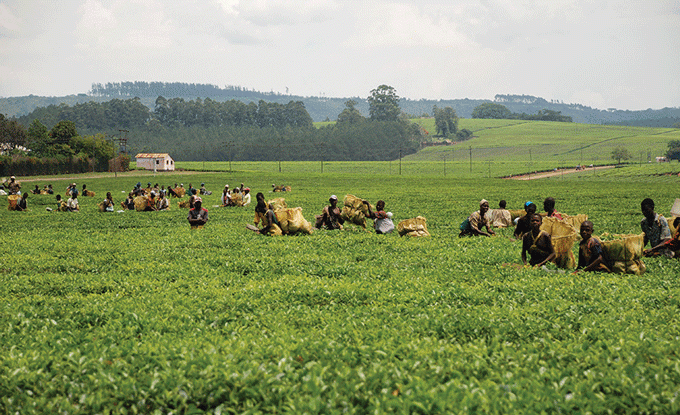
ONE of the biggest and oldest producers and exporters in the country, Tanganda Tea Company reported in a statement, which accompanied its half-year financial results to March 31 2023, that the late onset of the rainy season exerted a downward pressure on tea production.
Tanganda, which has operations in bulk tea, packed tea, coffee, avocadoes, and macadamia, has been trading for over a year now as a stand-alone company, after its unbundling from Meikles in February 2022.
In its first audited financials after the unbundling, bulk tea production took a 12% dip with dry weather attributed partially to the decline.
Despite coming from a low base, at 5 582 tonnes, another 6% drop in bulk tea production was recorded in the most recent reporting period, owing to the late onset of the rainy season.
Bulk tea sales also trailed 9% below the comparable period. Another tea producer and listed entity is Ariston Holdings, which has yet to release its half-year results.
In 2022, Zimbabwe exported tea worth over US$18 million, which is amongst the major agricultural exports. For the first five months to May 2023, Zimbabwe has exported tea worth US$8,6 million, representing a 5,5% drop in overall tea exports, which is comparable to the decrease in Tanganda’s numbers.
Tea prices on the international market marginally grew by 1% over the period under review to US$1,45 per kilogramme.
Under the agriculture division, Tanganda has five plantation estates in Chipinge with tea, coffee, avocadoes, and macadamia nuts. However, during the reporting period, the company did not report any revenue under the avocadoes segment.
- The brains behind Matavire’s immortalisation
- Community trailblazers: Challenges catapult Chikukuza to success
- Red Cross work remembered
- All set for inaugural job fair
Keep Reading
Generally, tea and coffee can be processed and sold in their bulk form or blended and packed and sold under the beverages division. The agriculture division was more profitable and contributed over half of the company’s top line.
Despite efforts to diversify its operations, the company remains reliant on tea with both bulk and packed tea accounting for 90% of the recently reported inflation-adjusted revenue.
Macadamia and avocado harvesting season only began at the end of the reporting season and their full contribution towards the group revenue can be realised in the year-end results.
Nevertheless, macadamia contributed 6% whilst coffee and water’s contributions were 2% and 3%, respectively.
In the period under review, Tanganda reported a gross profit margin of 51%, representing a thirteen-percentage point increase from HY22’s gross profit margin of 38%.
HY23 gross profit was even higher than the HY21 margin of 44%. However, although the use of margins helps reduce the effect of monetary distortions, the effect of inflation adjusting should never be downplayed.
On an operating profit margin basis, Tanganda’s profitability dropped to 35% compared to 47% in the previous reporting period.
The HY21 operating margin, albeit from unaudited numbers, was 54%.
Selling and distribution expenses also soared and contributed to the depressed operating margin.
The continuous decrease in operating margins may be a cause for concern and is reflective of the ballooning operating expenses in the period which more than doubled in inflation-adjusted terms.
In historical and unaudited numbers, Tanganda’s earnings per share were reported at ZW$12,76 for the half year, giving a rolling 12 months trailing earnings per share of ZW$9,68.
At current trading prices, the company will have a price-to-earnings ratio of 134X, which I opine is on the high end. Ariston, the company’s peer using the same metric is selling a 190X, which suggests that the market may have completely disregarded the metric in valuing these agriculture exporters.
Tanganda has done very well on the Zimbabwe Stock Exchange (ZSE) so far in the year in terms of share price movement with a YTD movement of 1 354% and is amongst the best-performing counters on the exchange using this metric.
Fellow agriculture peers like Seed Co and Hippo are amongst the top risers so far, express the bullish sentiment towards the agriculture sector on the ZSE.
Looking forward, the tea and coffee export market continues to look lucrative despite being affected significantly by weather patterns.
Avocadoes and macadamia nuts have a growing market, especially in China and other eastern countries.
However, I opine the market is currently overpaying for these expectations.
- Hozheri is an investment analyst with an interest in sharing opinions on capital markets performance, the economy and international trade, among other areas. He holds a B. Com in Finance and is progressing well with the CFA programme. — 0784 707 653 and Rufaro Hozheri is his username for all social media platforms.











